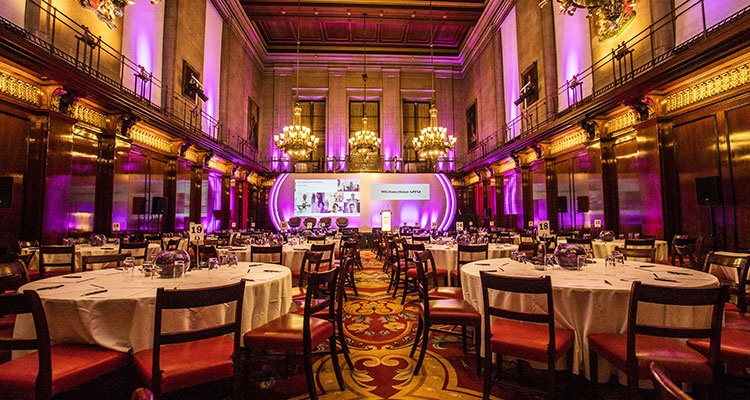How not to fail in the first five years of business
I deliberately sang like a strangled guinea pig in my Choir audition, sorry Mr Green. Despite this, I made music my career and then built an entertainment agency as an insurance policy. I now sit at the head of two corporate event companies. A deliberate entrepreneur in an accidental industry.
Stormont London is an entertainment agency for corporate events and LEP is an event production agency. Whether it’s a $18b merger conference or a Greatest Showman Themed Christmas party for 400 people, we make it happen. In the past couple of years, we’ve worked with Google, Amazon, Discovery Chanel, Disney, eBay, JP Morgan, Accenture, EY and Virgin in the UK, Saint Tropez, Madrid, Milan and Rome.
Obviously, I am making my life sound like a Narnia of entrepreneurial wonder and success but I assure you that is not the case, it never is. Overnight successes do not exist. The years have been long and filled with targeted hard work, mistakes and luck.
I thrive on structure and can see readers getting easily bored with a life story so instead I thought I would jump straight to the point: advice and anecdotes I have come across in the last 10 years of my journey.
Dedicate yourself and work with what you know
Despite my seppuku audition for the choir I was obsessed with music at Stowe – piano and drums, before you ask. I made it my mission to be the drummer or percussionist for every band and ensemble for which I could find the time. I think there is still a Stormont percussion prize handed out each year.
I was certain I wanted to be a professional musician and I was, for a time, but an economically challenged one. Growing a scalable business started to become a far more attractive prospect in my early-twenties (getting a ‘normal job’ certainly wasn’t, obviously).
I developed an event entertainment agency drawing on years of passive experience gained at the coal face. If you don’t know the industry or business model you want to build, go and work for someone else. The experience and connections will be invaluable. Make your mistakes in someone else’s time.
Run until you nearly fall over
Many of my friends have asked me for advice on starting their own company. In my mid-twenties, I had a full-time job at an event agency and ran my entertainment agency in my evenings and spare time. I pushed myself to breaking point before taking the leap. If you can, you should limit the size of the leap as much as possible. When I left my job, we had market research, competitor analysis, brand design, website, systems, a small client base and modest turnover already in the wings. Reduce the leap to a hop if you can.
If something’s worth doing, it’s worth doing well
One of my favourite phrases and an undoubted key to success for many. Will Smith said in an interview with Charlie Rose that it’s not about building a wall, don’t focus on the wall, you’ll cripple yourself with over-ambition and pressure. Just focus on laying the perfect brick. Then lay the next one.
In another great YouTube clip, Tim Minchin gives a university address and recommends focusing on strategic short term goals. The point is do whatever you are doing well. That will never let you down and if you are building a big picture for a business, take pride in the micro steps day to day along the journey.
Solve a problem
Our entertainment agency has seen measurable and clear success because we found a gap in the market and filled it – we offered a heavily curated roster with a speed and quality of service that outstripped our competitors with specific industry knowledge and a targeted strategy. A gap doesn’t have to be huge or ground breaking but if you are looking to start a business make sure you are solving a tangible problem.
Secure the right investment
We didn’t secure much start-up capital – we didn’t need it for our MVP (minimum viable product). I have always had a little chip on my shoulder about not going down the (seemingly) more glamorous route of VC funding or similar i.e. pitching your idea to investors and starting a business with say £500k and a team.
However, I have met and discussed business funding with many entrepreneurs on my travels. Some of my friends run businesses that have a team of 40 and a turnover of £4m within 3 years. These are the stories that capture the headlines but such businesses are rarely profitable for a few years and the CEOs are held accountable to investors and boards which can be stressful, time consuming and disheartening. Generally speaking, the CEOs of such companies have always said the same thing to me: if you can avoid heavy investment and selling parts of your company, do. Sometimes it is unavoidable but not every business needs this route.
They say Stowe has a tradition of producing entrepreneurs. It did of course produce Branson, arguably the most famous and quintessential entrepreneur in the world today (read his books by the way). Don’t be afraid to keep up the tradition, you have an enviable support network of staff, Old Stoics and parents that many would take years to develop without such a fortunate start in life.
In the Sixth Form, the relationships I had with the teaching staff were highly influential for me. I had some fantastic teachers who would treat you like a young adult if you earned their respect. They helped develop my skills with dealing with people and make no mistake, the world of business is still all about people and relationships.
Do not under appreciate the breadth of talents you can develop at Stowe and definitely don’t take the grounds for granted. Soak up everything it has to offer you whilst you can.
Mark Stormont (Temple 06), CEO, Stormont London
CEO & Co-Founder, London Event Productions
mark@stormont.com





